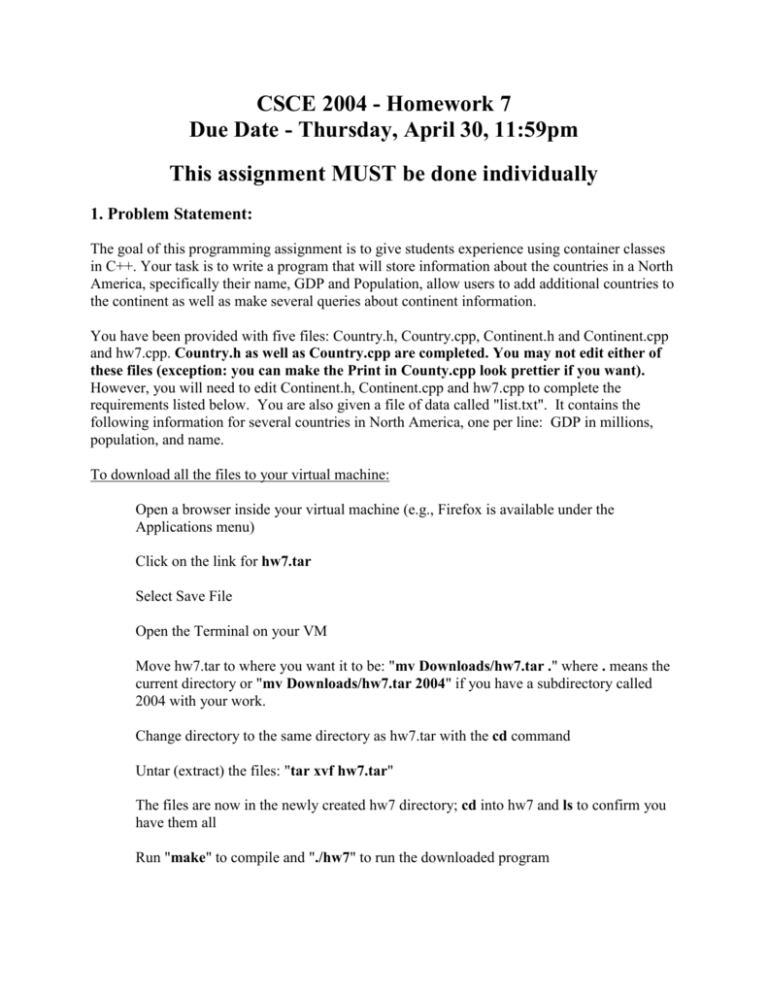Homework7 Due: Thurs, April 30
advertisement

CSCE 2004 - Homework 7 Due Date - Thursday, April 30, 11:59pm This assignment MUST be done individually 1. Problem Statement: The goal of this programming assignment is to give students experience using container classes in C++. Your task is to write a program that will store information about the countries in a North America, specifically their name, GDP and Population, allow users to add additional countries to the continent as well as make several queries about continent information. You have been provided with five files: Country.h, Country.cpp, Continent.h and Continent.cpp and hw7.cpp. Country.h as well as Country.cpp are completed. You may not edit either of these files (exception: you can make the Print in County.cpp look prettier if you want). However, you will need to edit Continent.h, Continent.cpp and hw7.cpp to complete the requirements listed below. You are also given a file of data called "list.txt". It contains the following information for several countries in North America, one per line: GDP in millions, population, and name. To download all the files to your virtual machine: Open a browser inside your virtual machine (e.g., Firefox is available under the Applications menu) Click on the link for hw7.tar Select Save File Open the Terminal on your VM Move hw7.tar to where you want it to be: "mv Downloads/hw7.tar ." where . means the current directory or "mv Downloads/hw7.tar 2004" if you have a subdirectory called 2004 with your work. Change directory to the same directory as hw7.tar with the cd command Untar (extract) the files: "tar xvf hw7.tar" The files are now in the newly created hw7 directory; cd into hw7 and ls to confirm you have them all Run "make" to compile and "./hw7" to run the downloaded program Continent.h: Each method of the Continent class has been listed as well as the private variables. However, some methods are missing their parameters. Based on the comments above each method in the Continet.cpp, fill in the appropriate parameters for each method in the .h file. Remember, not every method requires parameters. The parameters you place in the .h file must also be used in the corresponding .cpp file. o Example: The Country.h file is 100% finished. Below is a completed method from the Country.h file void GetCountryInfo(string &Name, int &Population, float &GDP); However, imagine that it looked like this: void GetCountryInfo(); //see Country.cpp to determine if parameters are needed Your goal would be to fill in the parameters based on the comments above the GetCountry info function in the .cpp file. The description is below: //----------------------------------------------------------// Name: GetCountryInfo // Purpose: Gets all the country's info // Arguments: ?? // Returns: void //----------------------------------------------------------Based on the name and comment for the function, I would guess that this was an accessor whose goal was to get all of a Country's private instance variable values. So, I would look at the number an type of the instance variables in Country.h and create a reference parameter to hold the values of each. I would then change the prototype to: void GetCountryInfo(string &Name, int &Population, float &GDP); in the .h and the .cpp; compile. After it compiles, I would add in the body for GetCountryInfo and test with a call from the main program: o string Name; int Pop; float GDP; Country Foo; o Foo.GetCountryInfo (Name, Pop, GDP); o // print Name Pop GDP Continent.cpp: Work on the methods on at a time as follows: Add the missing parameters in the .h file and the .cpp file compile and run the program Implement the method based on the comments above it. call the method with several different parameters in the main program to test hw7.cpp: Inside of the loop (in main) use either if statements or a switch to make the correct function calls Bonus (5pts Each): Implement the copy constructor of the Continent class. Create an additional method in the Continent class that utilizes information stored in the Country class Create another additional method in the Continent class that utilizes information stored in the Country class 2. Design: For this assignment, the first design task is to decide which methods in the .h file require parameters. Your second design decision should be how to check for errors in each method. 3. Implementation: Since you are starting with a semi-completed portion of code it is extremely important to understand the code that has already been provided. Since it can be difficult to understand someone else’s code it is extremely important to develop your code incrementally. This way your program does something even if it is not complete. Begin by implementing the simplest method first (e.g., AddCountry). For examples on containers classes see Lab 12. 4. Testing: Test your program to check that it operates correctly for all of the requirements listed above. Try your program with several input values, and save your testing output in text files for inclusion in your project report. This is worth 10% of the project grade. Be sure to have MULTIPLE tests. 5. Documentation: When you have completed your C++ program, write a short report using the project report template describing what the objectives were, what you did, and the status of the program. Does it work properly for all test cases? Are there any known problems? Save this report to be submitted electronically. 6. Project Submission: In this class, we will be using electronic project submission to make sure that all students hand their programming projects and labs on time, and to perform automatic analysis of all programs that are submitted. Rename your program, testing, and documentation files 123456789.Continent.cpp, 123456789.Continent.h, 123456789.hw7.cpp, 123456789.hw7.txt (typescript testing file), 123456789.hw7.docx using your UAID number in place of 123456789, and go the Blackboard site for this class and submit these five files. You do not need to upload Country.h and Country.cpp since they should be unchanged. The dates on your electronic submission will be used to verify that you met the due date above. All late projects will receive reduced credit: 10% off if less than 1 day late, 20% off if less than 2 days late, 30% off if less than 3 days late, no credit if more than 3 days late. You will receive partial credit for all programs that compile even if they do not meet all program requirements, so handing projects in on time is highly recommended. If your program does not compile, the correctness section of the project score will be a 0. This leaves 50 possible points for the project design, implementation, testing and report. 7. Academic Honesty Statement: group projects have been explicitly assigned. are NOT allowed to distribute code to each other, or copy code from another individual or website. ask the instructor and/or GTAs for assistance. This course will be using highly effective program comparison software to calculate the similarity of all programs to each other, and to homework assignments from previous semesters. Please do not be tempted to plagiarize from another student. Violations of the policies above will be reported to the Provost's office and may result in a ZERO on the programming project, an F in the class, or suspension from the university, depending on the severity of the violation and any history of prior violations.








